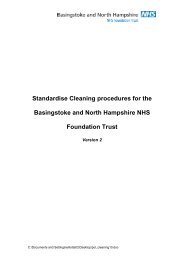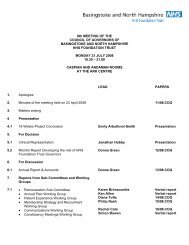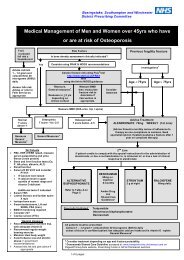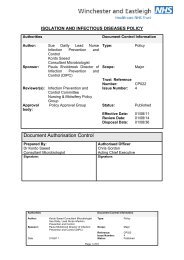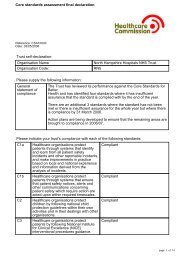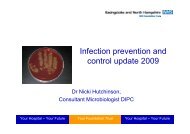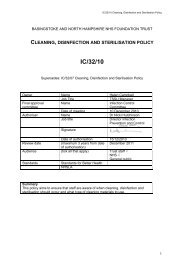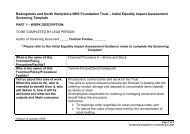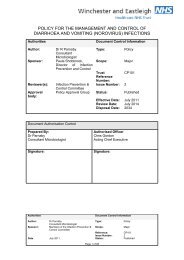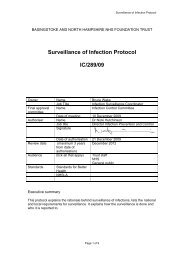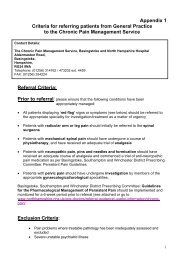MRSA Screening Inpatient Information - Hampshire Hospitals NHS ...
MRSA Screening Inpatient Information - Hampshire Hospitals NHS ...
MRSA Screening Inpatient Information - Hampshire Hospitals NHS ...
Create successful ePaper yourself
Turn your PDF publications into a flip-book with our unique Google optimized e-Paper software.
<strong>MRSA</strong> <strong>Screening</strong><br />
<strong>Inpatient</strong> <strong>Information</strong>
Why do I have to be screened?<br />
The Department of Health have made it compulsory for all acute <strong>NHS</strong><br />
trusts in England to screen all planned operations, some day case patient<br />
admissions and all emergency admissions for <strong>MRSA</strong> to help combat<br />
healthcare-associated infections in hospitals.<br />
What is <strong>MRSA</strong>?<br />
<strong>MRSA</strong> is an antibiotic resistant strain of a common bacteria called<br />
staphylococcus aureus. It stands for methicillin resistant staphylococcus<br />
aureus.<br />
Staphylococcus aureus is commonly found on humans and often lives on<br />
your skin not causing you harm. It can sometimes cause a number of<br />
common infections. Usually having staphylococcus aureus in your nose<br />
or on your skin will not harm you as the bacterium is not normally a risk to<br />
healthy people.<br />
People who carry it are not aware they do, and most of them will not have<br />
any symptoms. <strong>MRSA</strong> is a strain of staphylococcus aureus that can no<br />
longer be treated by methicillin (a type of antibiotic). However, we can still<br />
treat <strong>MRSA</strong>. It is estimated that around 7% of all patients who are<br />
admitted to hospital have the <strong>MRSA</strong> bacterium on their skin or in their<br />
nose already, even though they may feel well.<br />
How is <strong>MRSA</strong> spread?<br />
<strong>MRSA</strong> is mainly spread from person to person through hand contact. This<br />
is why washing your hands and using alcohol-based hand gels are so<br />
important. Good hand hygiene is one of the most important and effective<br />
ways of stopping the spread of <strong>MRSA</strong>.
What is screening and why is it being done?<br />
<strong>MRSA</strong> screening involves testing all patients over the age of 16 who are<br />
admitted to this hospital so we can identify those patients who are<br />
already carrying this bacteria. <strong>MRSA</strong> is more likely to cause an infection<br />
in people who are unwell or who have wounds, such as those already in<br />
hospital.<br />
This is why it’s so important to identify those people in a hospital who<br />
have <strong>MRSA</strong> on their body. It may help to prevent them from acquiring an<br />
infection due to the <strong>MRSA</strong> and from potentially spreading it to others.<br />
Also, if we can identify those patients who have <strong>MRSA</strong> on their body<br />
when they come into the hospital, we can make sure that they receive the<br />
best and most appropriate care and treatment for it.<br />
What does screening mean?<br />
<strong>Screening</strong> means that swabs will be taken from your nose and any other<br />
areas that the nurse thinks appropriate - usually wound sites, or<br />
anywhere the skin is broken. These swabs will be sent to the laboratory<br />
to be tested for <strong>MRSA</strong> and the results usually take three to four days. The<br />
nurse on the ward or the doctor will speak to you if your results come<br />
back as positive. If you have already been discharged, we will send your<br />
results to your GP.<br />
What happens if you find <strong>MRSA</strong> in my sample?<br />
<strong>MRSA</strong> can be treated. If you are found to be positive to <strong>MRSA</strong>, we may<br />
offer you treatment for it. Treatment may not always be appropriate for<br />
everybody but we will discuss this with you at the time. The treatment<br />
consists of a daily antibacterial body wash and the application of an<br />
antibacterial nasal cream. This will continue for five days and then you<br />
will have a rest period of no treatment for two days and then have<br />
another <strong>MRSA</strong> screen taken. Your nurse or doctor will explain your<br />
treatment and discuss the most appropriate care with you. If you are an<br />
inpatient in the hospital with <strong>MRSA</strong> we will usually care for you separately<br />
from other patients in a side room or in a bay with people with the same<br />
type of infection. Your <strong>MRSA</strong> positive status will not prevent you from<br />
being discharged as you will be able to continue your treatment at home.
Infection Prevention and Control Team<br />
Basingstoke and North <strong>Hampshire</strong> Hospital<br />
Aldermaston Road<br />
Basingstoke<br />
<strong>Hampshire</strong><br />
RG24 9NA<br />
01256 473202<br />
www.northhampshire.nhs.uk<br />
Infection Prevention and Control Team, BNHFT<br />
April, 2010<br />
Review April, 2011<br />
ELE/ 030/ 2010<br />
© Basingstoke and North <strong>Hampshire</strong> <strong>NHS</strong> Foundation Trust



